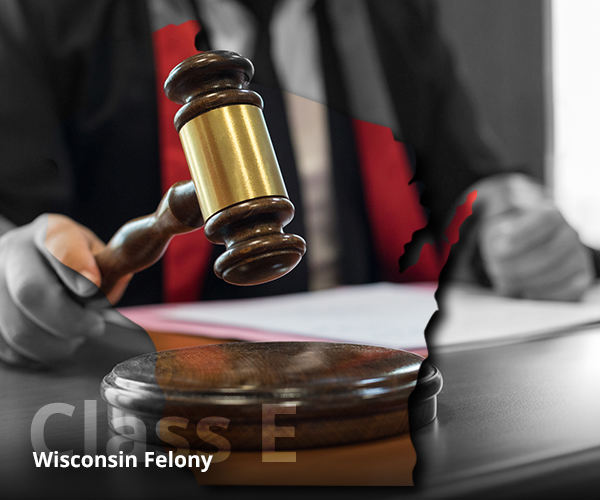A Class E felony in Wisconsin is punishable by up to 15 years in state prison and a maximum fine of $50,000 (Wis. Stat. § 939.50). These crimes include aggravated battery, hit and run causing bodily harm, and serious drug possession with intent to sell. A conviction can have devastating consequences, leading to a permanent criminal record, loss of civil rights, and long-term restrictions on employment and travel. If you are facing Class E felony charges, you need a skilled defense attorney who knows how to challenge the prosecution and protect your rights. Grieve Law is ready to fight for you.
What Is a Class E Felony in Wisconsin?
A Class E felony is a serious criminal charge in Wisconsin, punishable by a lengthy prison sentence and substantial fines. Class E felony convictions can have long-term effects on your future, including loss of voting rights, firearm ownership, and the ability to work in certain industries. Unlike misdemeanor charges, felony convictions cannot be expunged from your record. If you are facing a Class E felony charge, it is critical to understand the severity of the penalties and the importance of a strong legal defense.
Types of Class E Felonies
Grieve Law has successfully defended clients against Class E felony charges, including:
- Aggravated Battery causing great bodily harm
- Hit-and-Run involving great bodily harm
- Possession of Body Armor after a violent crime conviction
- Possession of Schedule I or II narcotics with intent to sell
- Possession of 3-10 grams of Methamphetamine or Rohypnol with intent to sell
- Possession of 5-15 grams of Cocaine with intent to sell
- Possession of 10 kilograms or more of Marijuana with intent to sell
Prosecutors push for maximum penalties in these cases, but Grieve Law knows how to challenge their strategies and fight for reduced or dismissed charges. If you are facing Class E felony charges, do not face them alone–call Grieve Law today for a free consultation. You are only guilty if you are convicted™.

Defenses for a Class E Felony in Wisconsin
Facing a Class E felony can feel overwhelming, but there are legal strategies that can protect your rights. From the initial court appearance to the trial, Grieve Law aggressively defends clients by identifying weaknesses in the prosecution’s case and challenging every piece of evidence. Our defense strategies include:
- Challenging Probable Cause: If law enforcement lacked a legitimate reason for your arrest or filed charges based on weak or misleading evidence, the case may not go past the preliminary hearing. Dismissing charges early can prevent a lengthy legal battle.
- Examining Constitutional Violations: If police officers conducted an unlawful search, seizure, or interrogation, any evidence obtained may be inadmissible.
- Motion Hearings: We aggressively file motions to dismiss charges or suppress evidence when improper procedures were followed. Pre-trial motion hearings often determine whether crucial evidence can be used against you, making them an essential part of your defense.
- Lack of Intent or Mistaken Identity: Many felony charges require proving intent, which is often difficult for prosecutors to establish. If there is insufficient evidence that you knowingly committed a crime, the charges may be dropped or reduced.
- Negotiating Charge Reductions: Some Class E felonies can be reduced to misdemeanors through strategic negotiations, leading to lesser penalties like probation, fines, or shorter sentences.
Grieve Law analyzes every detail of the case, challenges flawed evidence, and fights aggressively for the best possible outcome. Whether through dismissal, charge reduction, or an acquittal at trial, we work to protect your future.
References: Classification of felonies: Wisconsin Statute § 939.50 (2025)


 Keeping
Keeping 